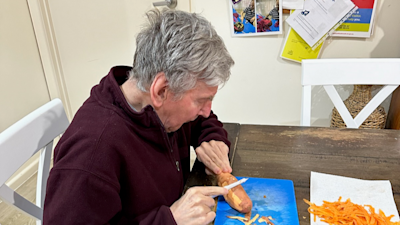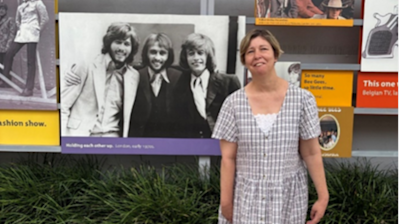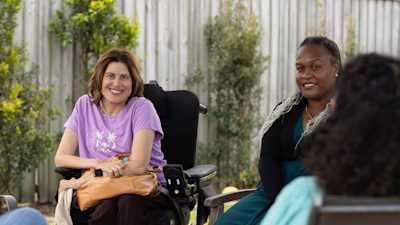How can we ensure people with disability are able to get the homes they want and need?

Image: Young couple Kay Garner and her partner Ryan Waters in front of a house. Kay is in a wheel chair and Ryan is standing beside her.
That’s the question that was discussed on the evening of Monday 3 May when a group of disability service providers, government representatives and academics came together to discuss new ideas for housing for the around 132,000 Tasmanians who have disability.
The forum is an initiative of Tasmanian service providers Life Without Barriers and Possability and was chaired by Life Without Barriers board member and former Disability Discrimination Commissioner Graeme Innes.
According to Life Without Barriers Executive Lead Disability Engagement Chris Chippendale, it’s a conversation that needs to be had because historically people with disability have had very little choice and control in the type of housing they had, where they lived and who they lived with.
“Our homes are a fundamental part of our life and our identity. Not only do they provide security and shelter, they also provide stability for people to obtain employment, have access to services that they need and create community connections.”
Prior to the NDIS the primary form of housing available particularly for people with intellectual disability was a group home – that’s where four to six people live together in a house that is staffed by support workers.
“You didn’t get to choose who you lived with, or who your support staff were. Now with the NDIS, eligible participants can access specialist disability accommodation funding to have a home that meets their needs,” Mr Chippendale said.
“That means for the first time, people with disability have choice and control. That might mean types of housing that we haven’t even thought of before, and thinking about how we can empower people with disability to exercise that choice and control when they haven’t been able to in the past.
“We also need to remember that some people with disability might choose to live in a group home, so how can we make it the best it can be?” Mr Chippendale said.
Possability’s Executive General Manager Strategy and Business Performance John Rowland said that what will also be discussed is that the vast majority of Tasmanians with disability do not have NDIS support for housing and that they also need to have access to housing that meets their support needs.
“We know that in Tasmania right now we are experiencing a housing affordability squeeze, with long public housing wait lists, very tight private rental vacancies and ballooning house prices across the state.
“Unfortunately Tasmanians with disability are more likely to be unemployed and experiencing poverty, so in this context how do we ensure that they have access to secure housing," John Rowland said.

Image: Group shot from the Ideas Without barriers forum in Tasmania. Image via Kym Goodes.
Claire Robbs, Chief Executive of Life Without Barriers, said, "Our Strategy 2025 is our open and transparent commitment that we don’t expect to be able to solve systemic barriers for people alone, we absolutely must partner and embrace collective wisdom and knowledge. My sincere thanks to every person who gave so much to our conversations over the past few days."
Another great reason to be proud to serve people with disability.
You can read more about our Strategy 2025 here.
Image: Peter Flude/The Guardian


